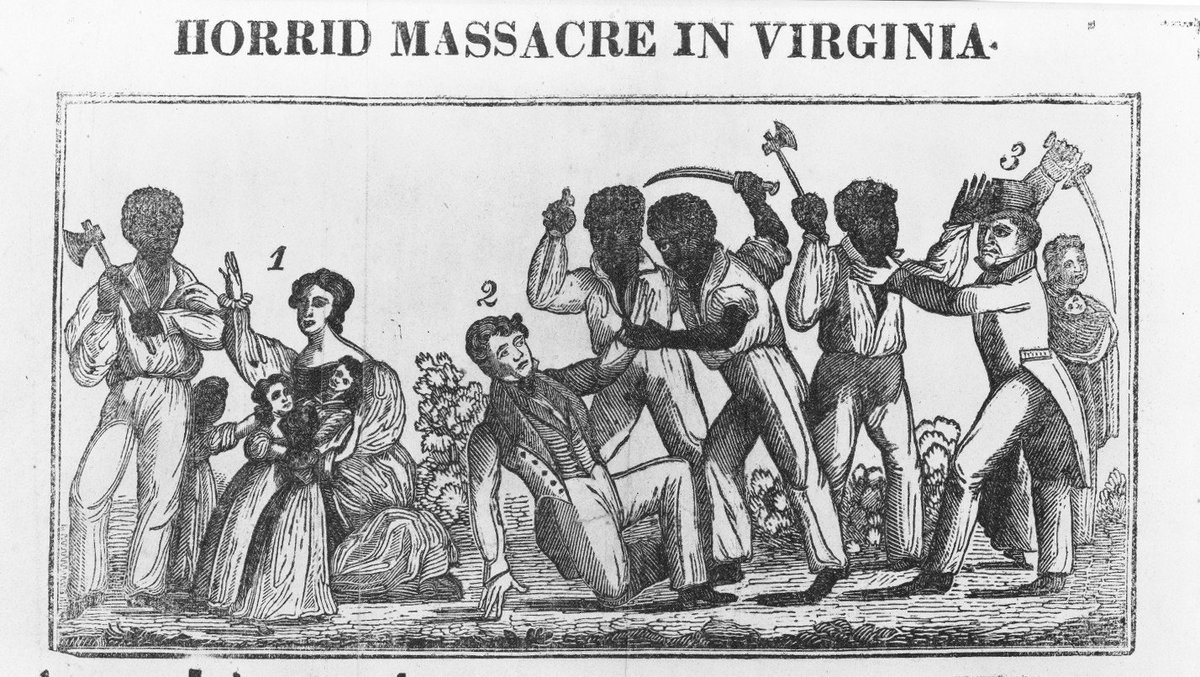
This Day in Labor History: August 21, 1831. Nat Turner leads the largest slave revolt in U.S. history, killing 60 whites before being put down. Let's talk about this epic moment of slave labor resistance! 

First, slavery needs to be part and parcel of any discussion of labor history. It's entire reason for existence was to create a force of unpaid laborers. Slave revolts are acts of labor resistance.
Nat Turner was a bit of an odd man it seems. He was a religious mystic who claimed to have visions that guided his actions. Unlike most slaves, he learned to read as a child and immersed himself in the Bible. He thought God spoke to him through his visions.
He ran away in 1825 for an entire month before a vision told him to return to his master. Despite this history of erratic behavior and escaping, he was allowed to lead religious services for slaves.
In 1828, he had a vision while working in the fields to prepare to lead his people from slavery.
He began preparing for this, building a trusted cadre of followers. In February 1831, an eclipse could be seen from Virginia, which Turner interpreted as the sign to make final preparations for his revolt. A follow-up eclipse in August signaled it was time to begin.
On August 21, Turner and his trusted group of 6 slaves began a war of extermination against the slaveholders. Armed with axes, knives, and blunt instruments, they went house to house in Southampton County, killing all the slaveholding whites they found.
At about 2 a.m., they reached the Travis household, where they murdered the entire family as they slept. Some of those slaves joined their force.
They avoided poor whites, preferring to concentrate on the slaveholders, in part so they could then free those slaves and expand their rebel army. Eventually, they had about 40 people willing to do anything to free themselves, even kill their masters.
The next day, Turner decided to march toward the town of Jerusalem. Although they moved swiftly and silently (not having any guns was part of this strategy–plus it was hard for slaves to acquire them), within 48 hours, the rebellion had been suppressed.
They faced an attack from the militia and were scattered. They attempted to attack another house, were repulsed and some captured.
They then faced an organized militia force that quickly dispersed them, killing 1 slave and capturing more. Most of the rest of the rebels were captured over the next few days.
Turner himself actually eluded capture for over 2 months. The state of Virginia wanted him alive so they could try him. Fearing he was hiding in the Great Dismal Swamp where he could live indefinitely, the state offered a $500 reward for his capture.
He was finally discovered hiding in a hole on October 30, tried on November 5, and executed on November 11.
Retaliation against Turner and his band was swift and harsh. They were almost all executed, 56 in total.
The militia also started a reign of terror against the local slave population, rounding up and murdering at least 100 innocent people. Northern editors decried the wanton killing, but for southern plantation owners, all blacks were potentially murderers.
The aftermath also saw southern states pass sweeping legislation to crack down on slave education and mobility. Most notably, states, including Virginia, passed laws making it illegal for whites to teach blacks how to read.
Seeing Turner’s apocalyptic visions based on the Bible as a very real threat to their control of labor and lives (after all, if slaves read the Bible, they might come across that slightly inconvenient story of Exodus…), they sought to undermine it through forced illiteracy.
The law was fairly unenforceable; if an elite slaveholder like Stonewall Jackson wanted to teach his slaves to read in quiet, the state wasn’t going to do anything about it.
But the laws did increase illiteracy and served to control the information slave labor had about the outside world. The state also made it illegal for either slaves or free blacks to preach, but that was obviously unenforceable.
The revolt also put the final nail in the coffin of Virginia’s long-standing, if increasingly dying, debate over whether to find an end to slavery.
That legacy of Jefferson and Madison already went out of fashion with the cotton gin and profitable investment in cotton lands in Alabama and Mississippi, but the fear of free blacks ended it entirely.
Most of what we claim to know about Turner comes from The Confessions of Nat Turner, written by a local white doctor named Thomas Gray.
How much of that document came from Turner’s mouth is impossible to say. It’s hard to think of it as all that accurate; on the other hand, it’s pretty much the only document we have on the man.
Nat Turner's revolt was just a moment of all-in fight to the death labor resistance, an act of freedom and an act of desperation. It's one that we should cherish as one of the bravest acts in American history.
Nat Turner's revolt also happened on the 40th anniversary of the Haitian Revolution's beginning, the most successful slave revolt in human history. In other words, August 21 should be International Black Freedom Day and celebrated!!!!
lawyersgunsmoneyblog.com/2016/08/this-d…
lawyersgunsmoneyblog.com/2016/08/this-d…
Back tomorrow to discuss the creation of flight attendant unionism.
• • •
Missing some Tweet in this thread? You can try to
force a refresh









